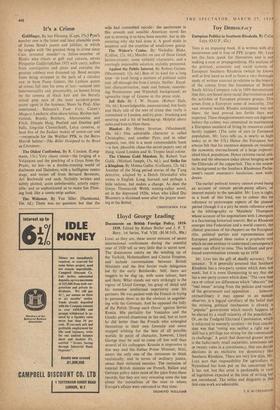Lloyd George Leading
Documents on British Foreign Policy, 1919- 1939. Edited by Rohan Butler and J. P. T. Bury. 1st Series, Vol. VW. (H.M.S.O., 80s.)
LONG as they are, these secret minutes of secret international conferences during the eventful year of 1920 tell us very little that is secret now. The discussions centre on the winding up of the Turkish, Hohenzollern and Czarist Empires, and include conversations between British Ministers and the first Soviet trade delegation led by the early Bolsheviks. Still, there are nuggets to be dug up, with some labour, here and there. What stands out very strikingly is the vigour of Lloyd George, his grasp of detail and his immense intellectual superiority over his partners. He was patient with the French in trying to persuade them to do the obvious in negotiat- ing with the Germans. And he opposed the folly of the Polish 'Drang nach Osten' against Soviet Russia. His partiality for Venizelos and the Greeks proved disastrous in the end, but at least he did better than the French who entangled themselves in their own formula; and never stopped wishing for the best of all possible worlds. In point of character, however, 'Lloyd George may be said to come off less well than several of his colleagues. Krassin is impressive in this way and the Italian Prime Minister, Nitti, seems the only one of the statesmen to think realistically, and in terms of ordinary justice, about their defeated enemies. The omission of internal British minutes on French, Italian and German policy takes most of the juice from these records, but they are very revealing none the less about the mentalities of the men to whom Europe's affairs were entrusted at that time.
DESMOND WILLIAMS






































 Previous page
Previous page